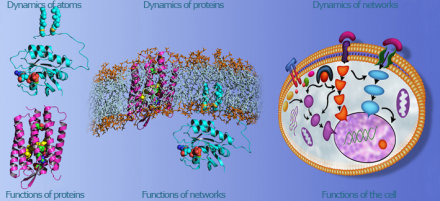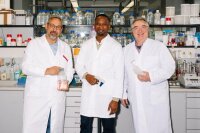Protein Research Department
Proteins have versatile functions which are required for cellular survival. This includes several transport-, catalysis-, and signal transduction pathways. Defective proteins, which are unable to fulfill their respective functions, can cause severe diseases. To investigate the structure, function, and networks of proteins, over 30 principal investigators (PIs) of the faculties Biology and Biotechnology, Chemistry and Biochemistry, Physics and Astronomy, as well as Medicine consolidated in the Protein Research Department (PRD). The research of the PRD addresses e.g. with questions how single proteins influence the survival of the cell, how the structure and function of proteins can be solved or how protein interactions can be utilized to develop new drugs against diseases.
The PRD is an interdisciplinary research network, which pools state-of-the-art research für a better understanding of cellular protein networks. In the focus of the research of the PRD are three specialist fields: (A) Biological foundations of protein research, (B) platform technologies of protein research, and (C) translation into application. In this network, topics like protein structure and mechanism, macromolecular configuration, functions of membrane protein complexes and cellular behavior from a molecular perspective are investigated with modern methods from structure biology, biophysics, biochemistry, and cell biology.
The primary goal of the PRD is to fill the gap between molecular and systemic approaches in protein research to understand cellular processes on the molecular level. A quantitative understanding of the complex biological processes on the cellular level requires profound knowledge of the relation between different genetically programmed and dynamically regulated networks. The focus of the PRD lies on processes involving or starting from bio-membranes. Since malfunction in said protein networks are responsible for a multitude of severe diseases, obtained insights should result in the development of biotechnological applications with long-term use for the public health, e.g. in tailor-made drugs in molecular therapy or in development of biomarkers.
The PRD is closely connected to the Center for Protein Diagnostics (PRODI; Head: Klaus Gerwert), which unifies foundational protein research, application-oriented diagnostics and therapy predication of neurological and oncological diseases. An additional pillar is the Medical Proteome Center (MPC; Head: Katrin Marcus), which is one of the leading institutes of its field of expertise and which provides state-of-the-art methods of proteomics, protein biochips and innovative bioinformatics. The third pillar of the PRD is the Center for System-based Antibiotic Research (CESAR; Head: Julia Bandow), which aims to develop new structure classes of antibiotics and identify novel bacterial modes of action and drug targets. The PRD is additionally supported by the DFG Research Training Group “Microbial Substrate Conversion” (MiCon; Speaker: Franz Narberhaus), which addresses mechanistical foundations of microbial metabolic processes on the molecular level, and the DFG Research Unit “Structure and Function of the Peroxisomal translocon” (PerTrans; Speaker: Ralf Erdmann), which wants to elucidate the mechanism of the import of folded proteins across the peroxisomal membrane.
PhD students are members of the International Graduate School of Biosciences (IGB) or the Graduate School of Chemistry and Biochemistry (GSCB), which offer an internationally recognized PhD program in protein sciences. The PhD students of the PRD are also members of the cross-faculty RUB Research School, which offers a comprehensive soft skill training for optimization of all forms of communication and professional conduct.
Protein Science in Bochum
Illustration of the different levels, on which biological processes are being studied within the PRD. The goal of this Research Department centers on bridging the gap between a detailled understanding of structure and function of single proteins in vitro as well as the rather qualitative understanding of protein interactions in protein networks in vivo, following this task both in „bottom-up“ and in „top-down“ approaches. This procedure allows firstly the identification of biomarkers for an early recognition of diseases, and secondly a directed intervention into disease-causing processes within molecular therapies.





